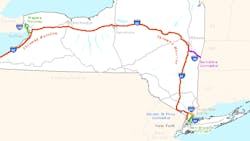Blind vendors challenge New York Thruway Authority for excluding their vending services in violation of state law
A dozen Empire State blind vendors are challenging the New York Thruway Authority’s failure to provide opportunities for blind entrepreneurs to operate vending facilities at renovated service areas as required by law.
The 12 operators on Jul. 1 filed a complaint against the Thruway Authority and the New York State Commission for the Blind for ignoring state law that requires all state agencies to maximize opportunities for blind vendors to operate vending machine services on state properties.
The vendors’ actions are supported by the National Federation of the Blind of New York, the American Council of the Blind of New York, the National Association of Blind Merchants, and the Randolph-Sheppard Vendors of America.
Karen Blachowicz, the chairperson of the New York Elected Committee of Blind Vendors, is the lead complainant in the filing.
According Blachowics, the Thruway Authority signed a contract for a private corporation to rebuild all 27 service areas along the state’s thruways. The contract was awarded to Applegreen, an Irish corporation, to operate the food services at those areas for the next 33 years.
The Mini-Randolph-Sheppard Act, a state law, requires that at least one vending machine facility must be operated by a blind vendor at each service area. Additionally, the law specifies that blind vendors operate all vending equipment at thruway service areas.
The Commission for the Blind, ignoring that law, recently revealed that the Thruway Authority is not planning any vending facilities to be operated by blind vendors at any of the 27 renovated service areas.
Moreover, to avoid allowing blind vendors to receive the revenue from vending machines, the Thruway Authority is allowing Applegreen to have no vending machines at the service areas, thereby depriving travelers of the opportunity to buy a quick drink or snack without standing in line.
The state Legislature amended the law in 2010 to make even more clear that it applies to the Thruway Authority. The vendors wrote to Matthew Driscoll, executive director of the Thruway Authority, on June 18, but have received no response.
When they previously reached out to Driscoll two-and-a-half years ago, when the Thruway Authority announced that it was soliciting bids for this contract, Driscoll assured them that the Thruway Authority would respect the Mini-Randolph-Sheppard Act’s requirements.
“We’re angry that the state is trying to deprive us of this important opportunity for blind entrepreneurs,” Blachowicz said, “but we look forward to vindicating our rights before a hearing officer or in court if the state does not come into compliance with the law. We are also angry that Matthew Driscoll lied to us when he told us that the Thruway Authority would provide these vending opportunities.”
Andrew Freeman, the lawyer for the New York blind vendors, added, “The Thruway Authority and Applegreen should be ashamed that they are attempting to avoid their obligations to promote blind entrepreneurship, and the Commission for the Blind should be insisting that they comply with the law. The plan to deprive travelers of vending machines in order to avoid sharing that revenue with blind vendors is particularly appalling.”
